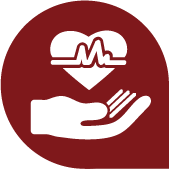Search for answers or browse our knowledge base.
Unintentional Injury from CPR to Persons Not in Cardiac Arrest

Red Cross Guidelines
- Lay responders and healthcare professionals should begin cardiopulmonary resuscitation based on their assessment and without concern for causing unintentional physical injury to persons not in cardiac arrest. REAFFIRMED
Insights
Cardiopulmonary resuscitation (CPR) performed by laypersons and bystanders is crucial for improving survival in out-of-hospital cardiac arrest. Despite this, bystanders may hesitate to act due to uncertainty about whether the person is truly in cardiac arrest, fear of causing injury with forceful compressions or potential legal liability. A recent systematic review of five studies involving 1,031 patients who received CPR despite not being in cardiac arrest found that only seven patients (0.7%) sustained unintentional physical injury, none of which were fatal. Mild symptoms such as chest pain or discomfort were reported in 24 patients (2%). Overall, the risk of injury from unnecessary CPR is very low, and the potential survival benefit of prompt intervention far outweighs this risk. Both laypersons and healthcare professionals should initiate CPR in suspected cardiac arrest without fear of causing unintentional harm.
